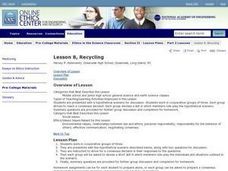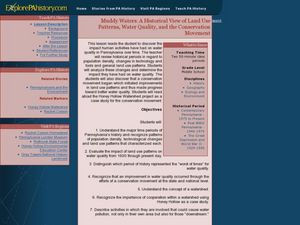Curated OER
Oscillator Circuits
In this oscillator circuits learning exercise, students answer 49 questions about different types of oscillator circuits. They find the operating frequency of circuits, they identify the functions of specific sections of circuits and...
Curated OER
Thyristors
In this electronics worksheet, students complete 25 short answer questions on thyristors. They identify the different types of thyristors and how they function in the circuit.
Curated OER
Power Conversion Circuits
In this electrical worksheet, students draw a schematic design and build a circuit board to grasp the understanding of power conversion circuits before answering a series of 30 open-ended questions including analyzing schematics. This...
Curated OER
Flora and Fauna of the Hill Neighborhood
Learners compare and contrast the characteristics of plants and animals. In this ecology lesson, students observe the outdoors and describe the relationship among different living things. They relate plant diversity with animal diversity.
Curated OER
Levels of Classification
Learners use diagrams to compare structural differences that taxonomists use to classify animals. In this classification lesson plan, students compare structures of different species from given diagrams. In one diagram they identify the...
Curated OER
Co-evolution of Plants and Pollinators
Young scholars explore biological evolution and natural selection and its evolutionary consequences. They also explore how organisms are interdependent on one another.
Curated OER
The Effects of Alcohol and other Teratogens: A model using Zebrafish
Students investigate the interference of various drugs on an embryo through experimentation. This is an open-ended lab to allow students to see effects of various chemicals humans choose to put in their bodies and create questions they...
Curated OER
Nerve Cell Informercials
Young scholars research the structure and function of the nervous system. They prepare a model or representation of neural transmission. Students create an infomercial about nerve cells.
Curated OER
Reptiles
In this reptiles worksheet, students review reptile adaptations, amniotic egg, and the characteristics of the different reptile groups. This worksheet has 8 fill in the blank and 19 matching questions.
Curated OER
Healing Fallen Warriors
Students read ancient Greek texts to explore evidence for healing wounds and compare ancient healing practices to those of modern times.
Curated OER
Scientific Methods in Biology
In this scientific methods activity, students will review the steps necessary in testing a hypothesis including the types of reasoning and variables involved. This activity has 6 terms in a crossword puzzle and 4 fill in the blank...
Curated OER
Can You Detect Bias?
Eleventh graders recognize some, but not all ethical processes (e.g., independent verification, clarifying assumptions, disclosing conflicts of interest) that shape scientific endeavors. Students build awareness of how various sources...
Curated OER
The Human Geonome Project Structured Controversy
Students debate government funding of the Human Genome Project. For this ethics lesson, students use the stuctured controversy framework to research the opposing viewpoints regarding project funding.
Curated OER
Who Will Care for the Water?
Students discover how humans impact natural resources. In this environmental lesson, students identify water resources in the local area and construct a T-chart to compare the positive and negative effects humans have on water resources.
Curated OER
Lesson 8, Recycling
Students examine recycling. In this environmental stewardship lesson plan, students practice persuading others to recycle as they collaborate to prepare small group skits. Students discuss the issue and write reflections about the...
Curated OER
Lesson 5, What Kind of Research Should Our Government Support?
Students examine research ethics. In this scientific research ethics lesson, students examine hypothetical research scenarios and determine which proposals should be funded with tax dollars.
Curated OER
Lesson 18, My Friend Linda
Students explore Huntington's Disease. In this biology lesson, students read My Friend Linda and examine the ethical issues brought to light in the story. Students discuss biotechnology issues and genetic testing.
Curated OER
Sars
Students discuss the Sars outbreak in 2003. In this biology lesson, students research the effect of the outbreak to the world. They create a public announcement about the topic.
Curated OER
Sustainable Agriculture
Learners explore examples of methods utilized in traditional agricultural practices. They state examples ot methods used in sustainable agricultural practices. They draw conclusions from information presented to them.
Curated OER
Backyard Wildlife Conservation
Students survey local wildlife. They distinguish between permanent and migrating or seasonal species. Students identify species and describe the ecological niche. Students research the food chain and food web for the backyard...
Curated OER
The Contemporary World - The HIV/AIDS Pandemic in Africa & Canada's Response
Students research the HIV/AIDS pandemic in Africa as an example of a contemporary global issue and will explore the ways in which the disease is being addressed with an emphasis on the Canadian government....
Curated OER
Muddy Waters: A historical view of land use patterns, water quality, and the conservation movement
Students research the impact that human activity had on Pennsylvania's water supply over time. In this water quality lesson plan, students research, discuss, and write about how Pennsylvania's water quality has been affected and what...
Curated OER
Stocking Up For The Next Millennium
Look back on the inventions, concepts, cultural items, and literary contributions of the past one hundred years. Young historians will compose a presentation based on the research they do in favor of one thing that should withstand the...
Curated OER
Investigating Earthquakes: GIS Mapping and Analysis
Pupils describes the technique of preparing "GIS-ready" data and shows how to map that data and conduct basic analyses using a geographic information system (GIS).They use latitude and longitude fields to plot the data in a GIS and...























